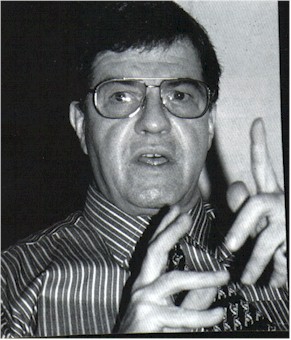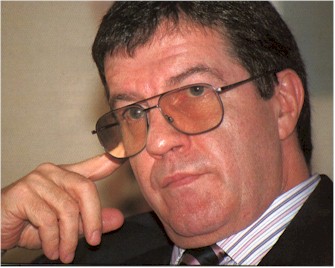INTERVIEW WITH AMBASSADOR JAMES HODGE
by
James Hodge
We all know that you get to become an ambassador by biding your time and gradually climbing up the rungs in your nation's foreign service, but how exactly is one selected for the post? "The head of the diplomatic service, the deputy undersecretary, and a number of ministers meet and review a slate of candidates and their records which are prepared by the personnel department of the foreign service," British Ambassador James Hodge tell us. "One can bid for a posting, but the selection is not made through an interview process as it would just be too costly and time consuming to do so."
The Ambassador reminds us that his job is not to promote Thai exports to the United Kingdom, but it his responsibility to try and encourage Thai investment in Britain and to promote British trade and investment in Thailand.
To that end, the Embassy has recently produced a video featuring Ambassador Hodge and Minister Abhisit Vejijiva which promotes investment in Thailand. It is an attempt to entice small and medium-size British businesses to invest in Thailand.
The Ambassador says Britain can play a key role in helping Thailand with its future privatization plans as the UK has experience and expertise in financial services, airport, power, water, and railway privatization. And all of these sectors are areas in which Thailand hopes to privatize.
Mr Rolf Soderstrom is currently working for the British Embassy as a private sector advisor. He is working closely with the Thai authorities and offering them advice as to how to best privatize their public sector.
 For years, Thais have loved to send their children to
study in the U.K. While the Ambassador says the crisis has obviously prevented many from
continuing to do so, he does say there are about 3,000 Thais currently studying higher
education in the UK. "A large number of British institutions have been able to make
special arrangements with the Thai students because of the crisis, and the British
community here has set up a scholarship program to send 300 Thai students to the UK
(please elaborate more on this). Thai students in the UK are studying business,
engineering, art and design, environmental management, media, hotels, catering, and
science technology. They also study at a wide variety of institutions but Leeds and
Newcastle are the most popular at the moment.
For years, Thais have loved to send their children to
study in the U.K. While the Ambassador says the crisis has obviously prevented many from
continuing to do so, he does say there are about 3,000 Thais currently studying higher
education in the UK. "A large number of British institutions have been able to make
special arrangements with the Thai students because of the crisis, and the British
community here has set up a scholarship program to send 300 Thai students to the UK
(please elaborate more on this). Thai students in the UK are studying business,
engineering, art and design, environmental management, media, hotels, catering, and
science technology. They also study at a wide variety of institutions but Leeds and
Newcastle are the most popular at the moment.
How does Ambassador Hodge think the Thais have responded
to the economic crisis? "The manner in which the Thai Government has responded to the
crisis has given us a lot of confidence. The fundamentals of the economy are sound, and
Thailand has a large adaptable workforce and a good infrastructure."
Number crunching: There are now 40,000 Thais living in the U.K. and there are more tourists from Britain (400,000 a year) coming to Thailand than from any other country in Europe. The UK is also the largest European investor in Thailand.
The Ambassador says Thai goods going to the UK include clothing, footwear, textiles and electronics. British goods coming here include machinery, chemicals, vehicles and consumer goods.
How does the Ambassador view the Irish Peace Accord? "Since the Good Friday agreement, we've had the elections of the Northern Ireland Assembly, we've seen the announcement of measures aimed at creating enterprise, investment and employment in Northern Ireland, and we've seen the introduction of a new criminal justice bill relating to Northern Ireland. So I, like many others, have been encouraged by what has happened in the last six months.
And what about the euro? "We want the single currency to succeed, and we have no problem with the principle of it. British membership of a successful single currency would be both beneficial to Britain and Europe. The key factor in determining UK membership is whether the economic benefits are clear and unambiguous. It's not in Britain's best interest to join the single currency in 1999, because our economy is in a different economic cycle than those of the countries which have already elected to join. We simply do not have the flexibility nor convergence to adapt to the euro just yet.
"As to when we will join, the government has said that it will not be in the lifetime of the present parliament. However, a great deal of work is being done in the UK to educate British business to the importance of the euro because these businesses will be able to operate with euros, and the local financial markets will be geared up for dealing with euros."
The Ambassador admits that visible British exports to Thailand have declined, yet he notes that there are a number of British companies that are quite active in Thailand. He points to Boots which arrived in Thailand only recently, has opened 12 shops, and is planning to open as many as 40 in the next few years. TESCO, the large British supermarket chain has also invested 350 million pounds into the Lotus supermarket chain here in Thailand.
Finis
(

